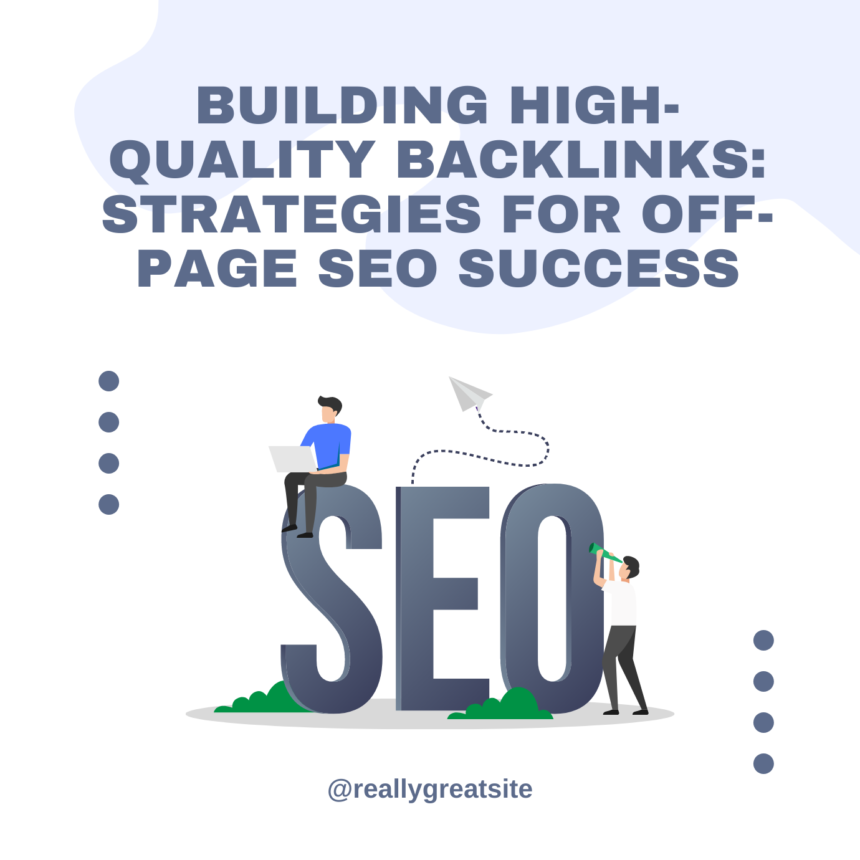Off-page SEO, particularly building high-quality backlinks, is crucial for improving your website’s authority, visibility, and search engine rankings. Backlinks are links from other websites to yours and are considered a vote of confidence in your content. Here are some effective strategies to build high-quality backlinks for off-page SEO success:
1. Create Outstanding Content: Producing high-quality and valuable content is the foundation for building backlinks. Create informative, engaging, and shareable content that naturally attracts links from other websites. Whether it’s blog articles, infographics, videos, or guides, focus on delivering exceptional content that people find useful and want to reference.
2. Guest Blogging: Guest blogging involves writing and publishing articles on other relevant and authoritative websites within your industry. By contributing valuable content, you can earn backlinks to your website in the author bio or within the body of the article. Look for reputable websites that accept guest contributions and ensure your content aligns with their audience and guidelines.
3. Influencer Outreach: Identify influencers and thought leaders in your industry who have a significant online presence. Reach out to them and offer to collaborate on content, interviews, or feature them in your own content. When they share or link to the content, it can generate high-quality backlinks and increase your brand’s visibility.
4. Broken Link Building: Find websites within your niche that have broken links or outdated content. Offer to help by pointing out the broken links and suggesting your own relevant content as a replacement. This strategy helps website owners fix broken links while gaining a valuable backlink in return.
5. Social Media Promotion: Leverage social media platforms to promote your content and engage with your audience. When your content gets shared and discussed on social media, it increases its visibility and the likelihood of gaining backlinks from users who find it valuable. Actively participate in relevant social media communities and engage with influencers to expand your reach.
6. Build Relationships: Cultivate relationships with other website owners, bloggers, and influencers in your industry. Engage with their content, provide insightful comments, and share their work. Building strong relationships can lead to organic link opportunities and collaborations in the future.
7. Create Link-Worthy Resources: Develop comprehensive and authoritative resources that provide significant value to your target audience. This could include in-depth guides, case studies, research papers, or industry reports. When others find your resources valuable, they are more likely to reference and link to them, establishing your website as a reputable source of information.
8. Participate in Industry Directories: Submit your website to relevant industry directories and listings. Ensure the directories are reputable and relevant to your niche. This can help generate backlinks and improve your website’s visibility within your industry.
9. Monitor Competitors: Keep an eye on your competitors’ backlink profiles. Identify the websites linking to them and evaluate their quality and relevance. You can reach out to these websites and present your content as an alternative or supplementary resource, aiming to secure backlinks.
10. Monitor and Disavow Toxic Backlinks: Regularly monitor your backlink profile using tools like Google Search Console and third-party backlink analysis tools. Identify and disavow any toxic or spammy backlinks that could harm your website’s SEO. Maintaining a clean and healthy backlink profile is essential for long-term SEO success.
Remember, the key to building high-quality backlinks is to focus on relevance, authority, and natural link acquisition. Avoid purchasing links or engaging in black hat SEO practices, as these can result in penalties from search engines. Consistently apply these strategies over time, and your website will gradually build a strong backlink profile, improving its visibility and authority
in search engine rankings.
